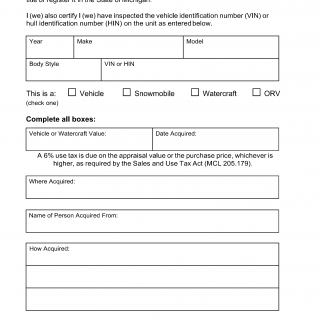Form TR-205. Ownership Certification
The TR-205 Ownership Certification form is a document issued by the Michigan Department of State that serves as a last resort for individuals who have lost, destroyed, or had their vehicle, watercraft, snowmobile, non-titled watercraft, or moped registration stolen and are unable to contact the previous owner for a duplicate title. The purpose of this form is to certify ownership of the mentioned vehicles and obtain a new title or registration.
To be eligible to use this procedure, the vehicle must be 10 or more years old (6 or more years old for ORVs), have a value that does not exceed $2,500 ($1,500 for ORVs), and must not be used with mobile homes or for vehicles acquired out of state without an out-of-state title. Additionally, the applicant must have exhausted all possibilities of contacting the titled or registered owner on record.
If the vehicle meets the above criteria, applicants must submit a vehicle appraisal showing the value is $2,500 or less. An appraisal completed by a licensed Michigan dealer or a page printed from an online appraisal service such as Kelly Blue Book, N.A.D.A. Guides, Edmunds etc., may be accepted. An appraisal is not required for watercraft, snowmobiles, ORVs, and mopeds.
Once the Ownership Certification and appraisal (for vehicles) have been completed, they must be submitted at a Secretary of State office where national databases will be checked to ensure the vehicle is not reported stolen or titled in another state. A 6% use tax is due on the appraisal value or the purchase price, whichever is higher, as required by the Sales and Use Tax Act (MCL 205.179). Proof of Michigan no-fault insurance must also be presented for vehicles when purchasing a registration.
This form is important for individuals who have lost or had their vehicle documentation stolen and are unable to contact the previous owner for a duplicate title. Its application examples include cases where the vehicle is old and has a value of $2,500 or less, and all possibilities of contacting the previous owner have been exhausted. The strengths of this form lie in its ability to provide an alternative solution for obtaining a new title or registration, while its weaknesses are that it can only be used as a last resort and may require a surety bond if the qualifications are not met.
Analogues to this form include a surety bond or contacting the previous owner for a duplicate title. The main difference between these forms is that a surety bond requires payment, while contacting the previous owner may not guarantee a response.
The future of participants is affected positively by this form as it provides an opportunity to obtain a new title or registration for their vehicle in a situation where other options are not available. The form is submitted at a Secretary of State office and stored in national databases.

